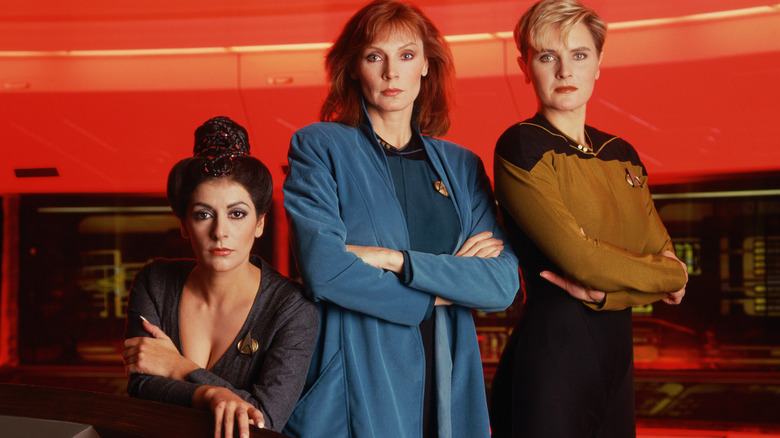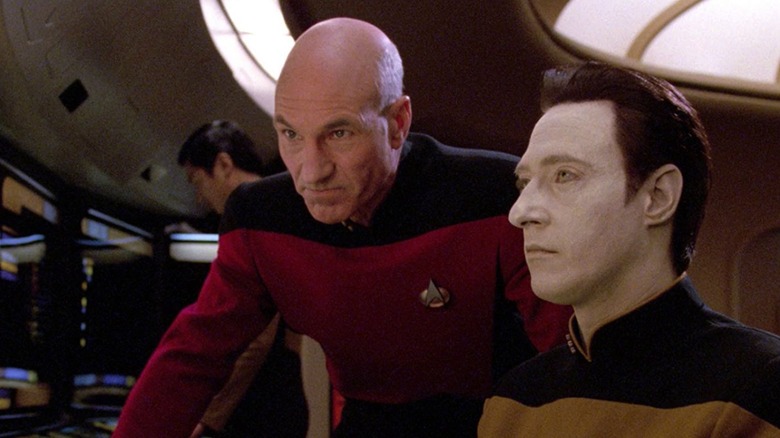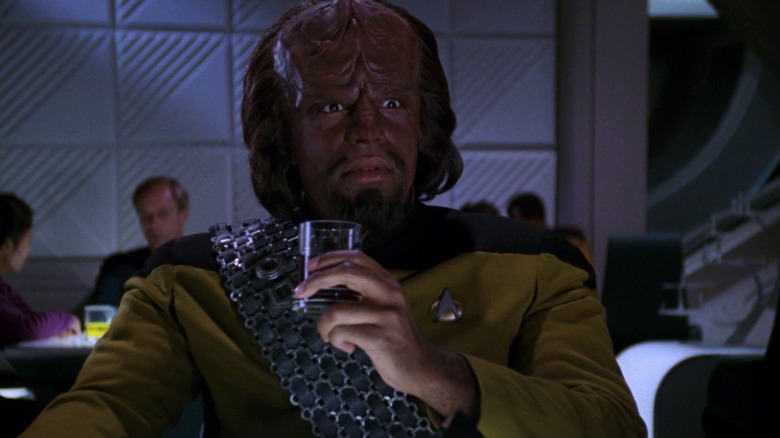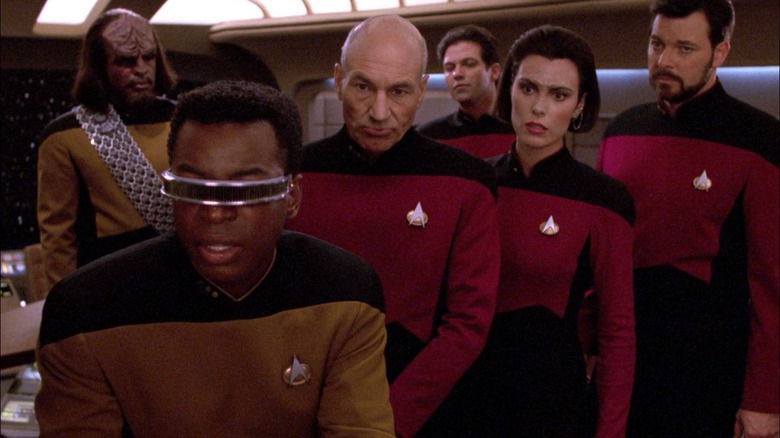Here's Where You Can Stream Or Buy Every Season Of Star Trek: The Next Generation
We may receive a commission on purchases made from links.
(Welcome to Where to Watch, which provides a clear and simple answer to the question, "Hey, where can I watch this thing?" In this edition: "Star Trek: the Next Generation")
"Star Trek: The Next Generation" debuted in 1987 as what would eventually make-good on the promise of Gene Roddenberry's 1966 original. After leaving the air after an inauspicious three seasons, the original "Star Trek" would find a second life in syndication, and a growing legion of fans would slowly form around the show, eventually gathering at conventions to trade trivia and merchandise. As these conventions continued throughout the 1970s, actors from the show would begin making appearances at these cons, and Roddenberry himself would begin going on speaking tours, conversing with the fans and codifying — to the fans and to himself — the show's themes of optimism, positive views on technology, and progressive politics. After Roddenberry was locked out of the "Star Trek" feature films in the 1980s, he wanted to come back to TV with a "proper" version of Trek, complete with a diverse cast, more conflict-free stories, and a more carefully thought-out philosophy and continuity.
Thus was born "Star Trek: The Next Generation," a TV series with two rocky seasons, four excellent ones, and one that's up for debate.
Star Trek is Still Everywhere
As has been previously mentioned in the hallowed pages of this venerable website, "Star Trek" is everywhere. The entire series run of "The Next Generation" is currently available to subscribers of Paramount+ (natch), Netflix, and Prime Video. Subscribers to DirecTV also have access to scattered episodes from seasons four, five, and six (arguably the best ones). You can also buy and download the series from Amazon, and AppleTV/iTunes (where it's $2.99 an episode, $29.99 per season), or the Google Play store and Vudu (where it's $1.99 per episode, $29.99 per season).
If you prefer physical copies, boy howdy, does "NextGen" have you covered. Starting in 1991, the show was issued by Paramount (in the United States), episode by episode on VHS. This was a dream for collectors, but a headache for those trying to save shelf space. That same year, Columbia House (remember them?) offered a mail-order subscription service which offered larger, cleaner packaging and two episode per cassette. As the years went on, and the series only increased in popularity, specialty box sets were issued, including a box set with all the Borg episodes, a box with four notable Data episodes, and a two-in-one box that featured only the first and last episodes of the series.
When it came to DVDs in the U.S., "The Next Generation" was initially released in 2002, with each full season boxed in a very keen, looks-great-on-a-shelf silver package. These DVDs were highly coveted and came with a sizeable price tag. In 2006, once all seven seasons had been released, they were packaged together in a large cardboard trough. In 2013, the same DVDs were released again, only this time with less interesting box art — each season sported a stylized portrait of one of the main characters — and slimmer, plastic cases. If none of those editions were appealing, a large green brick containing the entire series released in 2007 (in honor of the show's 20th anniversary), which wasn't nearly as gorgeous as the Borg Cube set released in England in 2003.
The Updated Blu-rays
But VHS and DVD are formats of the past, old man. Where's the HD-DVD or Blu-ray editions? After the success of the 2006 Blu-ray remasterings of the original series (wherein the show's special effects needed to be redone digitally as the original FX masters were, in many cases, no longer viable), CBS decided to do the same with "Next Generation" in 2012. There was a minor controversy with these Blu-rays and the studio chose to add motivation for fans to buy the series one more time: a new slate of special features and the like — but only if you bought certain versions at certain big box stores. This came after CBS had promised explicitly not to do that very thing. The new features were excellent, however, even if they were split up, causing all collectors to wail and rend their garments.
A man named Robert Meyer Burnett (director of the film "Free Enterprise") oversaw the special features, and explained that the studio spent $12 million to track down all its original assents, scan them digitally, and re-do many of the effects in CGI. It was a huge process, but the Blu-rays do look excellent while still retaining the 1990s look of the show.
The Blu-rays of "The Next Generation" are great, but because they were released at the same time the series started popping up on streaming, sales were less than impressive. Like with the DVDs and VHS editions, there were specialty Blu-ray box sets that bundled together commonly-themed episodes, like the Q episodes or particular two-parters. In 2016, an impressively stacked, but shoddily boxed complete-series Blu-ray set hit the market. It was the last time we saw the show released, and may be the last time on home video. Well, at least until another notable anniversary hits.
The Janet Jackson Super Bowl Scandal Led to More Star Trek
Follow me for a moment.
In 2004, Janet Jackson and Justin Timberlake performed at the Super Bowl XXXVIII halftime show, and, if you know your history (or saw the recent documentary), you are familiar with that event's introduction of the phrase "wardrobe malfunction" into the vernacular. The scandal surrounding this event led to a ban of all future halftime shows on MTV, owned by the entertainment giant Viacom, which also owned Paramount and "Star Trek." This worsened an already-bubbling corporate rivalry between the head of Viacom's CBS brand, Les Moonves, and the head of MTV, Tom Freston. The head of Viacom decided to keep them apart, and split Viacom into two smaller companies in 2005. It was pretty much a schism between CBS and Paramount.
This split meant, in short, that one company owned the TV rights to "Star Trek," and another owned the movie rights. It was during this time that the two companies tried to "out-Trek" each other, as it were, with the TV side of things pushing the multiple home video and streaming editions. Because it was one of CBS' most recognizable brands, they sold "Trek" everywhere, and most of the Trek shows are now widely available on most streaming platforms. CBS would also end up shamelessly milking the "Trek" brand with brand new shows like "Star Trek: Discovery" on CBS All Access (now Paramount+).
The Paramount side that owned the movies tried to reboot the series on the big screen. Because of obnoxious legal details, the new movies had to be a certain percentage distinct from the original series — hence the creation of a new timeline with a new design. We can blame a corporate split on both the creation of the Kelvin-verse, and the push toward "Discovery." The two brands re-merged in 2019, thank goodness. Although some might say the damage has been done.
In short: If there hadn't been a wardrobe scandal at the Super Bowl 17 years ago, "Star Trek" would be a lot cleaner today.



